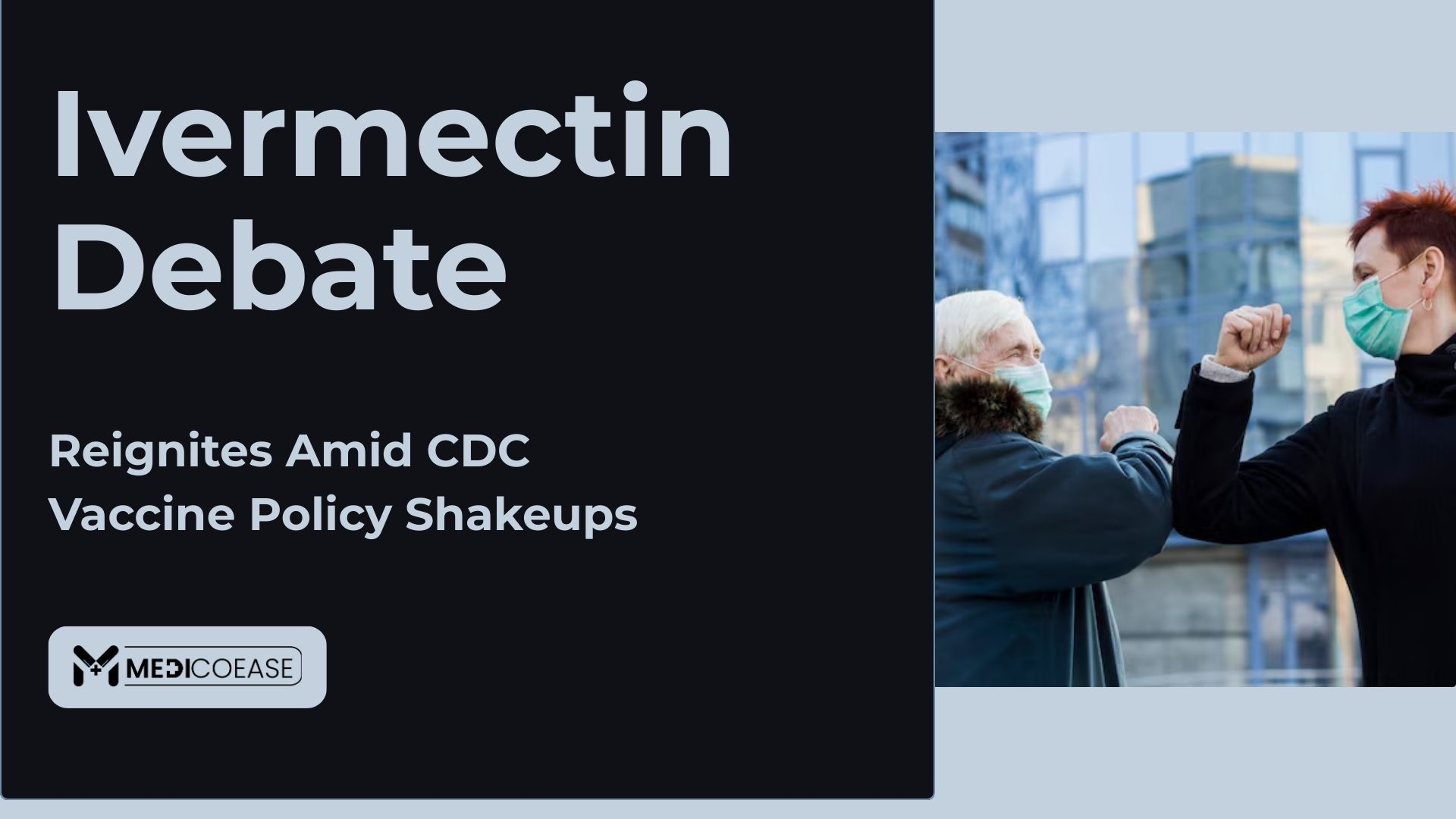In 2025, U.S. healthcare once again finds itself at the center of heated debate. The Ivermectin debate and U.S. healthcare reforms 2025 highlight deep divisions in public trust, medical guidance, and federal policy. Recent CDC shakeups in vaccine recommendations have reignited old disputes, forcing both policymakers and patients to reconsider the boundaries between government health directives and individual medical choice.
As Americans grapple with new infectious disease outbreaks, the rising popularity of weight-loss drugs, and questions about alternative treatments like Niclosamide and Fenbendazole, the conversation around ivermectin covid, its accessibility, and its role in patient empowerment has returned with force.
This blog explores the evolving landscape, weaving together vaccine policy reforms, alternative care controversies, mental health challenges, and the broader context of U.S. healthcare in 2025.
💉 CDC Reforms Impact Vaccine Guidance Across the Nation
The Centers for Disease Control and Prevention (CDC) has undergone sweeping reforms in 2025, reshaping vaccine policy nationwide. With growing concerns over vaccine safety, efficacy, and equitable distribution, the CDC shakeups are designed to rebuild public confidence.
🔄 Shifts in Vaccine Recommendations
- New streamlined guidance emphasizes personalized vaccine schedules rather than one-size-fits-all directives.
- Federal and state coordination has been updated to reduce mixed messaging, a persistent issue during the COVID-19 era.
- Expanded transparency measures now require more frequent public disclosures of trial data and adverse event reports.
📊 Public Trust and Skepticism
These reforms arrive amid declining trust in federal institutions. Surveys show that while many Americans welcome transparency, others interpret the changes as evidence that past guidance was flawed. This climate provides fertile ground for the Ivermectin debate to resurface, with some patients viewing the drug as a symbol of autonomy in healthcare choices.
💊 Ivermectin Debates Reignite in American Healthcare Policy
The Ivermectin USA conversation goes beyond the drug itself—it reflects broader tensions in how medical information is shared and how treatments are legitimized.
⚖️ Legal and Political Dimensions
- Legal discussions of Ivermectin usage in America continue in state legislatures, with some states loosening restrictions on prescribing, while others maintain tight controls.
- Politically, Ivermectin has become a wedge issue, with advocates citing Ivermectin role in patient health empowerment 2025 and critics warning against misinformation.
💵 Access and Price Concerns
- Patients searching for Ivermectin 6mg or Ivermectin 12mg often face confusion over legitimate sources.
- Through Medicoease, Americans can securely buy ivermectin at competitive rates, with clear guidance on ivermectin price transparency.
🧩 Beyond COVID-19
While much of the debate originated during the pandemic, advocates now discuss potential uses in parasitic infections and chronic disease management. However, the medical community remains divided, emphasizing the need for more robust clinical trials before expanded recommendations.
🧠 Mental Health Crisis Intersects with Treatment Accessibility
The U.S. is simultaneously navigating a mental health crisis that intersects with treatment accessibility. Many patients report feeling overwhelmed by conflicting healthcare narratives—vaccines, alternative drugs, and shifting policy landscapes.
📉 Stress and Trust Breakdown
- Ongoing controversies, including ivermectin covid debates, erode public confidence in health authorities.
- Patients dealing with anxiety and depression often turn to online forums, where conflicting information intensifies stress.
🏥 Accessibility and Empowerment
The renewed focus on patient empowerment highlights a deeper demand: patients want to feel heard, respected, and informed in their treatment choices. Empowerment means access—not just to pharmaceuticals, but also to transparent, evidence-based information.
🧪 Niclosamide and Fenbendazole in Alternative Care Debates
Beyond Ivermectin, the spotlight has expanded to other alternative care treatments like Niclosamide and Fenbendazole.
🔬 Emerging Conversations
- Niclosamide, traditionally used as an antiparasitic, is being explored in experimental oncology trials.
- Fenbendazole, a veterinary drug, has captured attention in patient-driven cancer discussions.
🧩 Controversial Role in Healthcare
While some see these drugs as promising, others warn of misinformation risks similar to those that surrounded Ivermectin. Federal regulators are cautious, emphasizing that while research is ongoing, promotion without clinical validation could mislead vulnerable patients.
⚖️ Weight-Loss Drugs Shift the Spotlight in 2025 Healthcare
In 2025, the explosive rise of weight-loss drugs such as GLP-1 receptor agonists has shifted the U.S. healthcare spotlight.
📈 Market Impact
- These medications dominate headlines, overshadowing debates about older drugs like Ivermectin.
- Insurers and policymakers wrestle with questions of affordability, long-term side effects, and accessibility for underserved populations.
🧍 Connection to Alternative Treatments
Interestingly, the public debate around weight-loss drugs parallels Ivermectin controversies: issues of access, equity, and medical authority dominate discussions.
🦠 Infectious Disease Outbreaks Raise Urgent U.S. Health Concerns
2025 has seen multiple infectious disease outbreaks—from seasonal flu mutations to rising tick-borne illnesses. These crises intensify the urgency of healthcare reform.
🚨 The Ivermectin Angle
In areas where conventional treatments face shortages, some communities revisit Ivermectin as a potential option for parasitic infections. While not universally endorsed, its reemergence in public conversation underscores the fragility of supply chains and the importance of preparedness.
🌍 Environmental Health Factors Influencing Chronic Disease Trends
Beyond pharmaceuticals, environmental health factors are shaping chronic disease trends in America.
🌱 Climate and Health
- Rising air pollution levels contribute to asthma and cardiovascular disease.
- Warmer climates are linked to expanded ranges for infectious disease vectors like mosquitoes and ticks.
🔄 Linking to Ivermectin Debate
The environmental context further complicates the ivermectin debate—as Americans confront new environmental threats, demand grows for diverse, accessible, and affordable treatments.
❓ FAQ: Ivermectin and U.S. Healthcare in 2025
Q1: Why has the Ivermectin debate resurfaced in 2025?
Because CDC vaccine shakeups and shifting public trust reopened discussions about medical autonomy and treatment options.
Q2: Can I legally buy Ivermectin in the U.S.?
Yes, but regulations vary by state. For safe and transparent access, patients can buy ivermectin via Medicoease, which provides Ivermectin 6mg and Ivermectin 12mg at competitive ivermectin price points.
Q3: Is Ivermectin still considered a COVID-19 treatment?
Officially, major health authorities remain cautious. The phrase ivermectin covid persists online, but further clinical evidence is needed.
Q4: What role do politics play in the Ivermectin debate?
Political influence heavily shapes healthcare demand, with state legislatures often dictating access policies that vary across the U.S.
Q5: How does Ivermectin connect to patient empowerment?
For many, Ivermectin symbolizes patient health empowerment, allowing individuals to advocate for their treatment choices within a complex healthcare system.
🏁 Conclusion: Navigating Healthcare’s Uncertain Future
The reemergence of the Ivermectin debate amid sweeping CDC reforms highlights a deeper reality: American healthcare in 2025 is as much about trust and transparency as it is about medicine. Whether the focus is on vaccines, weight-loss drugs, or alternative care like Niclosamide and Fenbendazole, patients seek clarity, autonomy, and affordable access.
As environmental pressures grow and new outbreaks emerge, the challenge lies not just in finding effective treatments but in ensuring that the U.S. healthcare system can adapt, respond, and rebuild public trust.


